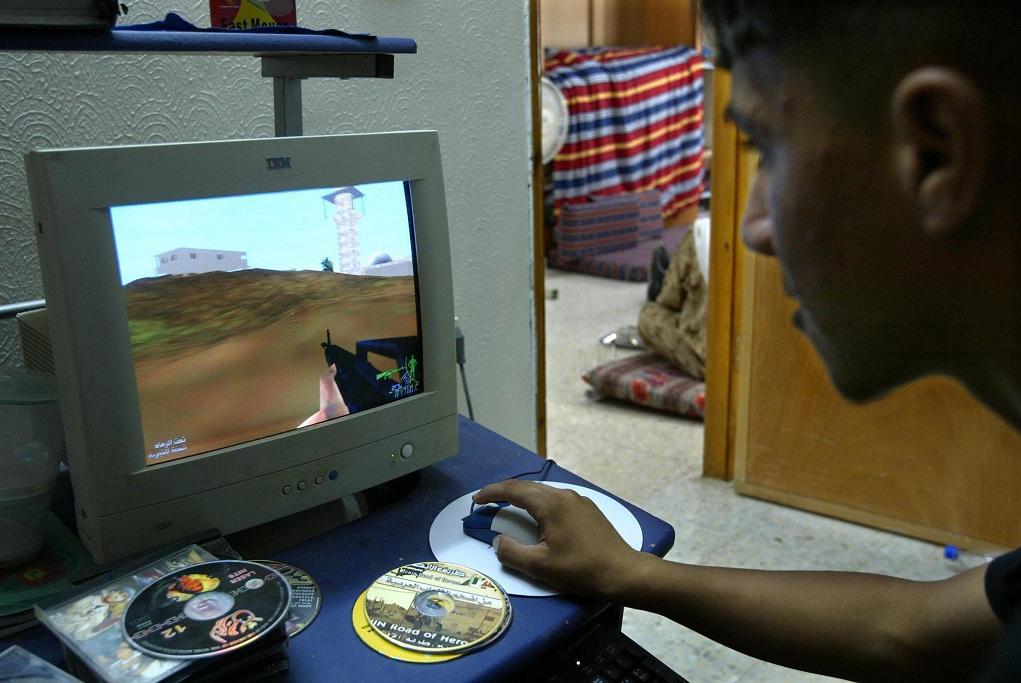Video games provide safe haven in countries wracked with violence, terrorism
Tarek Owweis plays a videogame call ‘Jenin street of Heros’ in Jenin in the West Bank 22 September 2004. The fiercest fighting of the entire intifada took place in Jenin in April 2002 when 23 Israeli soldiers and around 50 Palestinians were killed in a vast army raid, dubbed Operation Defensive Shield. Ever since, Jenin and its refugee camp, comprising 70,000 inhabitants, have been seen as the ultimate symbols of the Palestinian struggle against Israeli occupation.
As the US ramps up its covert war against Yemen-based terrorist network al-Qaeda in the Arabian Peninsula, just a few hundred miles to the southwest, counter-terrorism in Somalia has a new face — video games.
Seeking refuge from the heat and danger of Mogadishu’s streets, teenagers are flocking to LAN centers to play video games for the first time, a practice that wasn’t allowed when the Al Qaeda-affiliated group Al Shabab was in control of the Somali capital. With the militants gone, young men are beginning to enjoy games like FIFA, a soccer game wildly popular around the world and in neighboring Yemen as well.
"I spend half of my day here. The video games are fascinating," said Abdirizak Muse, a 16-year-old who dropped out of his Mogadishu school in early 2011 after Al Shabab militants dug trenches around it, according to the Associated Press.
The parents of young men in Mogadishu often worry that their children don’t have enough progressive options for entertainment. Again speaking to the Associated Press, one parent considers playing video games as a positive alternative and diversion from the violence surrounding them.
"This is his daylong activity because I don't want him get bored and go to war,” said Mohammed Deq Abdullahi, a father of two teenaged boys. “The busier they stay the more tired they get, and the more they ignore violence."
Just across the Horn of Africa and the Red Sea, gamers in Yemen’s capital of Sanaa enjoy similar games. Yemen is the Arab world’s poorest country, but many of its younger citizens still manage to play video games in their spare time, even on days when real life violence flares. FIFA is far and away Yemen’s most-played video game. Other titles like Counterstrike 1.6 and Red Alert are not far behind.
When you are gaming in a public LAN center in a capital gripped by revolution, political instability and shortages of just about everything, the power will always eventually go out. But in Mogadishu and Sanaa, extreme violence and shortages has done little to dampen gamers’ spirits.
In some cases, Somali teenagers have credited video games with saving them from a life of violence with Al Shabab.
"Many of my friends are unlucky and have taken part in the violence in the country. Some of them have died. Others are carrying guns around. In some ways, video games have saved my life," Ali Abdi, 15, told the Associated Press.
The article you just read is free because dedicated readers and listeners like you chose to support our nonprofit newsroom. Our team works tirelessly to ensure you hear the latest in international, human-centered reporting every weekday. But our work would not be possible without you. We need your help.
Make a gift today to help us reach our $25,000 goal and keep The World going strong. Every gift will get us one step closer.
